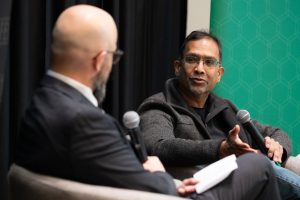In February, a group of entrepreneurs based at Invest Ottawa headed to the startup mecca of Silicon Valley to meet with venture capitalists and find out more about life in the big leagues of high-tech.
During their two-week trip, they toured world-renowned accelerators such as the Plug and Play Tech Center in Sunnyvale, Calif., dined at the home of FormVerse CEO and angel investor Kirk Deininger and rubbed shoulders with dozens of other businesspeople from around the world who share their dream of building the next generation of tech juggernauts.
Though they didn’t land any immediate seven-figure deals, they say the knowledge they gained and the network of contacts they made could prove invaluable down the road.
(Sponsored)

Advertising or posting a job opportunity is about to get more complicated for many local organizations with 25 or more employees. That’s because of a slew of updates to Ontario’s

Desjardins Elevator Pitch Competition drives entrepreneurial energy at uOttawa
In uOttawa’s Desjardins Elevator Pitch Competition, a single team member stands before the judges, pitching for three minutes, fielding questions for five. There are no decks, notes, props or prototypes
OBJ print editor David Sali recently sat down with three of these entrepreneurs – Treasure Chest Marketplace founder George Borovec, Zination CEO David Ker and Aetonix founder Michel Paquet – to talk about their experiences. Here is an edited version of the conversation.
OBJ: What did you learn from this trip?
George Borovec: It literally is like coming back with a secret knowledge that you can only get by being there. It’s up to us to share that with everybody else now. The rules that we learn here do not apply there – on multiple levels. (Potential investors and VCs) have a full grasp of what we do within seconds. You can tell them, ‘Here’s what we do’ and they know what you need to do next, what you need to do in terms of getting to the exit. They know what it’s gonna take, peoplewise, moneywise, almost instantly.
Michel Paquet: I really believe it was a life-changing event for me. I’ve been to the Valley before a hundred times with previous companies. But going as an entrepreneur, being immersed in 30,000 other startups, everybody is trying to help each other, and investors are actually there also as mentors and giving you feedback on how you should do business in the Valley, which is very different. For us, it was a crash course in two weeks on becoming a successful entrepreneur.When you’re here, you have a dream, which is to start your business and to launch it and to be successful. Not that you second-guess yourself, but you’re a little bit risk-averse. When you go there, you realize there are many others like you, and the dream is really possible. We were at the TechCrunch (Crunchies Awards) and we went to see the best startups of 2014. You see those guys – they started from nothing to build companies that are worth billions. You suddenly realize, your stuff is as good as theirs. You start to realize that we can do it. We just have to be more self-confident and push it through.
GB: The mentality there that we don’t see here is, ‘How can we help you?’ I don’t think there was a single person we met who didn’t say, ‘How can I can help you? What do you need from me?’ That was the catalyst. From there, it was go, go, go.
OBJ: George, you mentioned after the trip that you had to be careful when making your pitches. If you asked for too little money, you might come across as out of touch, but if you requested too much, it might seem like you had an exaggerated view of your company. How did you manage to walk that tightrope?
GB: That happened to me the first night. During the pitch, it finally came to, ‘How much capital do you need?’ I said, ‘We’re looking for a million dollars.’ And right away they replied with, ‘How about $5 million?’ I said, ‘That would also help.’ (Laughs.)
MP: We had great support from Invest Ottawa. (Vice-president of marketing and communications Jon Milne, who also attended) was always there to say, ‘You know what? You’ve got a great story. Let’s change it a little bit and move on.’ That was fantastic. It gave us a lot of enthusiasm and reach.
David Ker: We had a chance to meet so many people, coming from France, Brazil, India, Korea, Japan. They don’t stay there permanently, but they have a footprint there. They have an office at Plug and Play, they do work from there. They want to help because it’s a place to do business. The best way to do business is to collaborate. They’re not shy to come talk to you at all.
MP: This was tough work. We were in the Valley for about three days and it (already felt) like we were there for two weeks. The first day, I had a meeting at 7 a.m. It was really about collaboration amongst us.
GB: At the end of each day, we all came together at the house, relayed our stories, shared all that stuff, and went through any issues that did come up. The value you got out of those meetings … it was, ‘Here’s where you need to get to, and here’s what you need to do to get there.’ That is invaluable. And we all got it.
OBJ: So you really had to be on the ball when you making your pitches.
MP: The good news is, even if you (were asked for) information you don’t know, people make plays for you to come back to it. George and I met one group (of investors from Santa Cruz) five times. You could see their professionalism, analyzing what we were doing. It was amazing.
GB: One of them happened to be the BitTorrent co-founder (Ashwin Navin). That was our final meeting. They valued us and literally their thought was, ‘Yes, you are billion-dollar companies.’ The question next is, ‘How do we get you there?’
OBJ: Do you think our culture can change here in Canada to become more like that?
GB: It’s up to us. We all used our network to reach out to their network in the Valley. You don’t need Invest Ottawa, you don’t need anything else. You can put it together yourself. Think out of the box about what it’s gonna take to get you there. It’s not that complicated. There’s a bit of work involved, but just get it done.
MP: There, entrepreneurs are seen as celebrities. If you’re an entrepreneur and you’re successful, everybody talks about you. It’s very different. When we went to (the Crunchies), it was really like going to the Oscars. It was really fun to watch. You see this and say, ‘I could be one of them.’
DK: Their ideas are mindblowing.
GB: A big part of that is, there is no inkling of, ‘You can’t do that.’
OBJ: Do you think initiatives like the Innovation Centre at Bayview Yards are going to change our collective mindset and make us more willing to take risks?
MP: It’s definitely a good step, but the reality is, we’re talking about 30,000 startups vs. a few hundred. There is a massive difference between the two cultures. That’s not going to change overnight.
GB: Culture doesn’t come from a building. It comes from everybody in that building. I think that’s sort of where we’re a little behind. We need to push (entrepreneurs) together. As much as you put into your startup, you have to put into each other. They do it there.
MP: At the end of the day, we’re here to create jobs. We need to get the support to make this happen – to break barriers.
DK: (Startups in the Valley) embrace failure. And that is a big thing. Embracing failure doesn’t mean just the founder himself. The culture accepts failure. They don’t see failure as (something) where you are completely down. They see failure as a way for you to keep going up. But they are smart about it as well. It’s not just failing for no reason.
OBJ: Any final advice to others who are thinking of doing a similar trip?
MP: You’re going there to meet people to start with. Don’t go there thinking you’re going to get a cheque. That’s not realistic. I think all of us came back here with the idea that our product could be global. There’s nothing stopping us. It’s just pushing, hard work, leadership, the right connections. It will happen.


